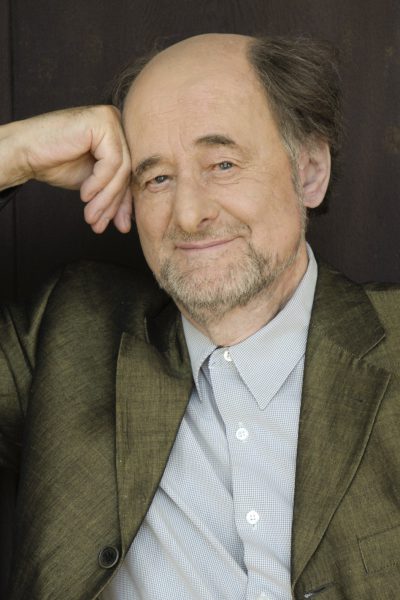Born into a distinguished Oxford family which was musical as well as academic, from the age of ten Roger Norrington studied the violin and was a keen amateur singer. He won a choral scholarship to Clare College, Cambridge, where he studied English Literature and participated in the university’s vigorous musical life: in addition to singing he was active as an instrumentalist and conductor, and studied conducting with Sir Adrian Boult at the Royal College of Music. After graduating from Cambridge he went into publishing but continued to conduct, forming the Schütz Choir in 1962. His musical activities were halted when his employers sent him to work in Africa; but here he decided to make his future career in music and after returning to England he became a professional singer and conductor, leading numerous concerts and recording works from the seventeenth- and nineteenth-century choral repertoires with the Schütz Choir for the Argo record label. The choir was often accompanied in concert by the London Baroque Players.
In 1969 Norrington took up the post of chief conductor of Kent Opera, remaining with this company for fifteen years and conducting a wide repertoire of forty different works, a fact which helped to prevent him being narrowly labelled as a musical specialist. He made his debut with the English National Opera with Mozart’s The Marriage of Figaro in 1973, and at the Royal Opera House, Covent Garden with Handel’s Samson in 1986. He has conducted opera in Italy at La Scala, Milan; La Fenice, Venice; and at the Maggio Musicale, Florence; as well as in Vienna, Berlin, Paris and Amsterdam. In order to pursue the performance of a wider repertoire on period instruments than was then usual he formed the London Classical Players in 1978; the orchestra’s programme of concerts was often supplemented by popular ‘Experience’ weekends, during which interpretation and performance were examined in depth. In addition Norrington conducted the London Classical Players in a highly praised series of recordings for Virgin and for EMI (after its acquisition of the Virgin label) which included the complete Beethoven symphonies as well as orchestral works by Berlioz, Brahms, Bruckner, Mendelssohn, Schubert, Schumann, Smetana, Weber and Wagner. Conductor and orchestra also toured widely, visiting Germany, France, Holland and Belgium, and in 1989 they appeared in the USA and at the Salzburg Festival.
Norrington’s research into original scores and into the size, seating and playing style of the orchestras of the nineteenth and early twentieth centuries has had a remarkable influence on the way music of this period is both perceived and performed. He has been particularly vigorous in his pursuit of reducing the amount of vibrato used by string players in symphony orchestras. ‘It’s one of my missions to make this way of playing freely available to any intelligent musician,’ he has commented in interview. He has appeared with many of the major orchestras of Europe and the USA as a guest conductor, suggesting different ways of performing the traditional symphonic repertoire. His permanent appointments have included those of chief conductor of the Bournemouth Sinfonietta (1985–1989) and chief conductor of the Orchestra of St Luke’s in New York, (1990–1994); he became chief conductor of the Stuttgart Radio Symphony Orchestra in 1998 and of the Camerata Salzburg in the same year. In 2006 he took up the position of artistic adviser to the Handel and Haydn Society of Boston, one of North America’s leading period performance groups. In England Norrington works closely with the London Philharmonic Orchestra, of which he was principal guest conductor in the mid 1990s, and with the Orchestra of the Age of Enlightenment, which took over the work of the London Classical Players in 1997, the year in which he received a knighthood.
Norrington’s career has developed in an outward progression from musical specialist to acclaimed international maestro. He has effectively harnessed contemporary academic ideas of period performance to concerts and recordings in ways that have attracted wide interest and popular enthusiasm, and above all he has successfully bridged the potential divide between conducting orchestras that use period instruments and those that use modern ones, bringing new ideas to both. His discography accurately reflects all these progressions. While most of his recordings have many different points of interest, those of the complete Beethoven and Brahms symphonies are especially notable, as are his accounts of the Symphonies Nos 4 and 6 of Vaughan Williams. His operatic conducting is less fully represented on disc, but his accounts of Mozart’s Don Giovanni and of Purcell’s The Fairy Queen are good examples of his strengths in this field.
